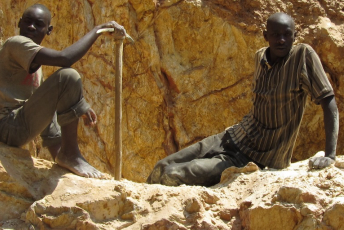Burkina Faso’s artisanal gold mining sector provides incomes for about 700 000 people – 13 times more than formal mining at 52 000 people – and is central to its gross domestic product. Its importance will continue to climb as climate change increasingly threatens agriculture and livestock.
So when the country closed its artisanal gold mining sites on 28 July this year due to the rainy season and growing insecurity, it was a blow both to local livelihoods and the economy.
The Burkinabe government has repeatedly closed artisanal gold mines to prevent terrorists from using them for financing – especially Jama’at Nusrat al-Islam wal-Muslimin (JNIM), the most prominent and influential group in the country. But this approach has long-term, unintended implications, potentially undermining state legitimacy while increasing support for jihadist groups, with detrimental results for peace and security.
In 2018, when the governor of the Est region ordered the closure of artisanal mining sites in order to cut off sources of funding for violent extremist groups, aggrieved miners turned to jihadists for help. The jihadists managed to reopen certain mines.
Similarly, the government banned artisanal gold mining in the northern provinces following an attack on the Solhan gold mine in June 2021, during which 160 people were killed. Critics believed this ban would merely stoke grievances among miners and local communities, enabling jihadist groups to gain greater legitimacy by safeguarding access to the mine sites. Since the attack, JNIM has continued to be active in the province.
Governments across West Africa where armed groups operate have imposed similar measures, but bans have repeatedly proven counterproductive.
In Niger, security concerns led to the 2017 closure of the Djado Plateau goldfields, which was the largest artisanal mining site in the country. It provided livelihoods for tens of thousands of people at the time of closure. This fuelled grievances in the Tebu and Tuareg communities and led many into crime, particularly banditry.
Similarly, attempts to close artisanal and small-scale gold mining sites in Chad’s Tibesti region to prevent rebel groups from drawing recruits and revenue from the goldfield instead fuelled recruitment into armed groups.
Prohibitions can also swell illicit gold flows. In Ghana, suspected illegal gold flows significantly increased after a government ban on small-scale gold mining in the country from 2017 to 2018.
The gold sector is often enmeshed in local communities and holds significant implications for perceptions of the legitimacy of local and national authorities. Approaches that seek to eradicate artisanal and small-scale gold mining tend to undermine state legitimacy. By depriving communities of livelihoods and increasing economic fragility, states fuel distrust and tensions between local populations and national authorities.
This is particularly true when local communities see these tactics as a bid by the government to gain control over the gold sector for the benefit of other actors, an accusation that holds some weight. Governments sometimes protect the gold mining interests of the ruling elite and financially powerful or prioritise industrial mining interests over artisanal mining.
These incidents reduce livelihoods and exacerbate already high levels of economic insecurity. At a gold mine in Yatenga province in Burkina Faso, one community leader said: ‘We have no other activities; if tomorrow we lose everything, how are we going to feed our families?’
But they also undermine the trust the community has in government representatives, with devastating consequences for government legitimacy and efficacy in local communities.
Jihadist groups have repeatedly used access to artisanal gold mining sites as a key element of their recruitment and governance strategies. For example, when JNIM arrived in Burkina Faso’s Cascades region in mid-2021, they said they would allow unrestricted access to several gold mines in the Dida Forest, near the Côte d’Ivoire border, in return for contributions from the extracted gold.
In the east of Burkina Faso, jihadist preachers target their sermons at people who are deprived of access to gold deposits, positioning jihadist groups as alternative livelihood providers.
Artisanal mining does pose dangers. These include the unsafe use of explosives, increased risk of cave-ins due to climactic conditions (exacerbated in the rainy season), mining in protected areas, and pollution of local waterways due to chemical use in processing gold bearing ore. But these risks are not limited to artisanal mining, as seen by recent deaths in the Burkina Faso industrial mining sector due to flooding and insecurity.
Therefore, is the closure of artisanal gold mining areas in regions where few comparable alternative livelihoods exist, and where armed groups are poised to step in, the most sensible approach?
How states regulate the artisanal gold sector in Burkina Faso and across the region is crucial to shaping the perceived legitimacy of the state, and of armed and jihadist groups, in the eyes of communities. Closing the mines for short-term potential gains to disrupt jihadist group financing has so far had limited success and is more likely to have negative long-term effects on communities’ economic security and government’s apparent legitimacy.
Efforts to regularise informal artisanal gold mines and enhance operational safety at mine sites should be considered over blanket closures. Governments should rather provide artisanal miners with secure, reliable land rights and access to gold deposits.
They should also support capacity development and establish more accessible financing and gold trade options in the formal sector to artisanal miners and local gold buyers. This would be more effective in realising the potential of the artisanal gold sector. It would also more positively address challenges around security, governance and economic security, and minimise potential unintended negative fallout with detrimental long-term consequences.
Marcena Hunter, Thematic Lead on Extractives and Illicit Flows and Lucia Bird, Director, Observatory of Illicit Economies in West Africa, Global Initiative Against Transnational Organized Crime







